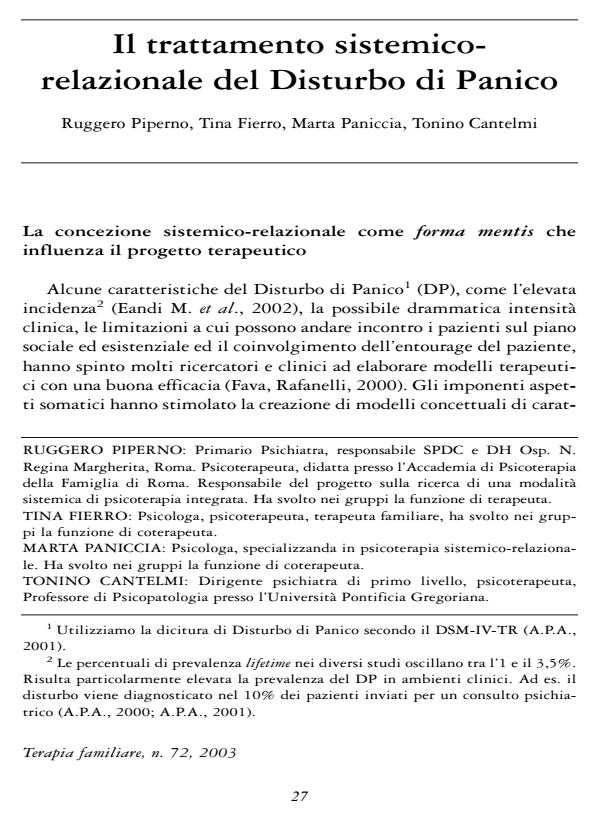Il trattamento sistemico relazionale del disturbo di panico
Titolo Rivista TERAPIA FAMILIARE
Autori/Curatori Ruggiero Piperno, Tina Fierro, Marta Paniccia, Tonino Cantelmi
Anno di pubblicazione 2003 Fascicolo 2003/72
Lingua Italiano Numero pagine 34 P. Dimensione file 115 KB
DOI
Il DOI è il codice a barre della proprietà intellettuale: per saperne di più
clicca qui
Qui sotto puoi vedere in anteprima la prima pagina di questo articolo.
Se questo articolo ti interessa, lo puoi acquistare (e scaricare in formato pdf) seguendo le facili indicazioni per acquistare il download credit. Acquista Download Credits per scaricare questo Articolo in formato PDF

FrancoAngeli è membro della Publishers International Linking Association, Inc (PILA), associazione indipendente e non profit per facilitare (attraverso i servizi tecnologici implementati da CrossRef.org) l’accesso degli studiosi ai contenuti digitali nelle pubblicazioni professionali e scientifiche.
This article is the result of a psychotherapy with two groups of people with Panic Disorder (both with 1 terapist, 1 co-terapist and 10 patients). It has been supposed that group perspective, in some respects, should prove more advantageous for specific PD’s features. We aimed at understanding how much Panic Attack reveals itself in relationship’s establishment and at helping patients to move in different ways, also by short steps, towards an improvement. For keeping psychotherapy accessible to most people, a therapy pattern that should be as successful for symptomatology as for personality organisation was proposed, keeping in mind stronger hypothesis about psychological and biological PD’s development. The epistemological background is systemic-relational. We tried to find a therapy that should allow for either unsettled clinic situations or for indispensable goals. An hypothesis for change and for mental transformation, rather than an inflexible therapy model, was pursued, assessing the whole factors for specific situations, acting on the ones considered more active, and then testing the outcomes that interventions in a specific area arouses in the others. The treatment with these groups pursued specific aims: To reach symptomatology’s control and reduction; To recover relational functioning; To change where possible, some outlooks on world which represent the individual personality organization; to assume to pass to a self-help group, at the end of the psychotherapy.This work argues that panic fear, through group psychotherapy process, turns out to be less painful. Moreover, the group bears a best emotive and social level of functioning, meeting the patients expectations for both effectiveness and cheapness.
Ruggiero Piperno, Tina Fierro, Marta Paniccia, Tonino Cantelmi, Il trattamento sistemico relazionale del disturbo di panico in "TERAPIA FAMILIARE" 72/2003, pp , DOI: